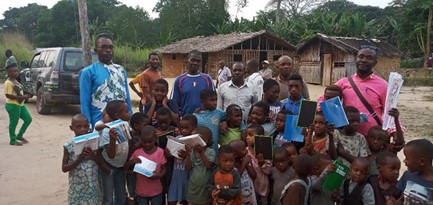The building blocks of pledging to the Bonn Challenge – Cameroon’s story
Cameroon recently announced a 12 million hectare restoration pledge to the Bonn Challenge by 2030 – the largest thus far from Central Africa. The question arises, how do countries decide to commit? What is the groundwork that goes into it? We look closer at Cameroon’s experience.
IUCN first started working with the Government of Cameroon to advance its REDD+ agenda, with a focus on building the capacity of local, sub-national and national government agencies and NGOs and on convening multi-stakeholder platforms on rights-based approaches to REDD+.
This included an IUCN-supported National Civil Society Platform for REDD+ and Climate Change that provided an important mechanism to advance gender-related issues and share experiences of mainstreaming rights-based approaches with the broader civil society network. In another partnership, collaboration with the IUCN Member National Committee in Cameroon successfully linked local REDD+ results with national and regional processes.
Political support for FLR grows
As Cameroon’s REDD+ interventions expanded, the government was able to measure and highlight the impacts of forest conservation on issues of national concern such as food security. This direct linkage with the Sustainable Development Goals (SDGs) played a valuable role in building political momentum for the protection of forests.
Globally, by late 2015, the focus was on UNFCCC COP21 and the emerging Paris Agreement. Several countries capitalised on this opportunity to make restoration commitments to the Bonn Challenge and to align them with their carbon-reduction targets. NEPAD, the World Resources Institute (WRI), the World Bank and other partners launched the African Forest Restoration Initiative (AFR100), which mobilised several African countries to announce restoration commitments that contribute to the Bonn Challenge. The Cameroonian government reached out to IUCN to initiate a conversation on forest landscape restoration (FLR) and how it could help them achieve their multiple national and international priorities.
The conversation was timely as IUCN was working with the Government of Rwanda and the Secretariat of the East African Community (EAC) to host a high-level ministerial meeting on FLR in July 2016 for countries from East and Central Africa. The meeting resulted in the Kigali Declaration – a landmark regional agreement adopted by 13 countries to push the restoration agenda.
The Kigali Declaration was later endorsed by COMIFAC ministers (including Cameroon) at their November 2016 meeting. Participating ministers also encouraged countries who had not already done so to make pledges to the Bonn Challenge.
In the lead up to the COMIFAC meeting, IUCN’s regional teams had worked with the Congo Basin Forest Partnership (CBFP) and the government of Rwanda to bring together 30 secondary school students and 100 participants from public and private institutions involved in forest conservation to discuss the importance of restoration. The session provided a platform for young people to exchange their experiences and opinions on strengthening FLR interventions in COMIFAC countries. Their passionate demands to invest in FLR were recognised and translated into action by ministers at the November meeting – a significant victory for civil society.
 Photo: IUCN
Photo: IUCN
Further support for Cameroon’s growing commitment to FLR came through two dialogues between the Ministry of Forestry and Wildlife and the Ministry of Environment, Nature Protection and Sustainable Development to reinforce the synergies between the country’s REDD+ and Forest Law Enforcement, Governance and Trade (FLEGT) actions.
Cameroon announces its pledge
The groundwork was in place for Cameroon to make a pledge. They had the necessary support from both implementing agencies and civil society.
In February 2017, after a series of consultations with IUCN and partner organisations, the government committed to restoring 12,062,768 hectares of deforested and degraded land by 2030, as part of the Bonn Challenge. Cameroon’s Minister of Forestry and Wildlife, Philip Ngole Ngwese, and Minister of Environment, Nature Protection and Sustainable Development, Pierre Hele, jointly made the commitment, joining 18 other African countries that have pledged to the Challenge.
The way forward
IUCN and partners will be working closely with Cameroon to operationalise its pledge to the Bonn Challenge. Work is already underway.
In October-November 2016, an inception workshop was held in Douala for The Restoration Initiative (TRI), a 10-country FLR programme funded by the Global Environment Facility (GEF) and led by IUCN in partnership with the United Nations Environment Programme (UNEP), and the Food and Agricultural Organization of the United Nations (FAO). Cameroon is one of the 10 countries where TRI will provide technical knowledge and innovative financing and decision-support tools for FLR.
In addition, IUCN is assisting the Government of Cameroon in submitting a project to the Green Climate Fund (GCF) focused on restoration.
Cameroon has much to gain from its commitment to restoration – gains in livelihoods, biodiversity, climate, and more – and now joins the 39 other Bonn Challenge pledgers who are making progress in addressing the planet’s most pressing challenges.
###
IUCN has been working closely with Bonn Challenge countries to define their pledges, initiate national-level assessments to zero-in on suitable FLR interventions, and provide ongoing technical and capacity-building support. For more on IUCN’s involvement with FLR and the Bonn Challenge, visit www.infoflr.org.





